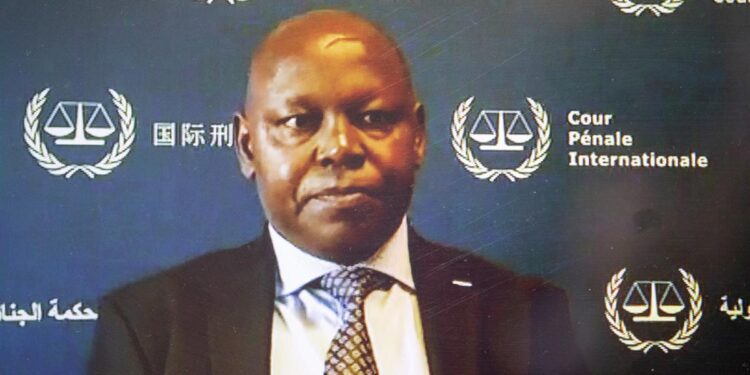By Janet Sankale
The stage has been set for Kenyan lawyer Paul Gicheru’s first status conference before the International Criminal Court next week as the prosecution and defence completed the filing of their submissions.
The submissions, a follow-up on an order by Trial Chamber III scheduling the conference, also dwelt substantially on Gicheru’s trial.
The prosecution’s submissions, dated September 14, 2021, said both parties have agreed that Gicheru’s trial should commence in March 2022. However, the final date will be set by the presiding judge, in this case Judge Miatta Maria Samba.
The submissions, signed by Deputy Prosecutor James Stewart, state that the prosecution has based its assessment of the time needed to complete outstanding investigations and the disclosure of evidence that it intends to rely on at trial, which it estimates it will be in a position to do by December 1, 2021.
The prosecution also estimates that the review of materials in its possession will be completed by February 1, 2022, a month to the proposed starting date.
The prosecution said it plans to call 12 to 13 witnesses to give oral testimony at the trial. It further explained that six witnesses (P-0800, P-0536, P-0613, P-0341, P-0274, and P-0516) will testify on how they were corruptly influenced by the accused and his associates; three prosecution investigators will testify on discrete aspects of the investigation; an analyst will testify on the analysis of the content; and two to three expert witnesses will testify on the recovery of data obtained in the course of the prosecution’s investigations.
The prosecution added that it will call witnesses in person, although it did not rule out the possibility that certain witnesses may testify via audio and video link.
It intends to rely on documentary evidence, including records of investigators; communications with witnesses; transcripts, translations and audio recordings of witnesses and members of the common plan; telephone data including cellphone contacts, text messages, and address book entries; recanting affidavits; bank records of witness of P- 0397; expert and analytical reports; and public source material.
The prosecution disclosed 589 items of incriminating evidence, which it said it considers to be the bulk of the most relevant evidence in relation to the charges under Article 70 of the Rome Statute against the accused.
On the other hand, the defence has not provided any information on anticipated evidence.
“The defence cannot at this time determine whether to call any witnesses – as normally no credible defence counsel can prognosticate prior to the OTP putting on its case and surviving any potential “No case to answer” challenge by meeting its burden of proof – and is thus not in a position to inform on the translation requirements of any witnesses it may call,” said Gicheru’s lawyer, Michael Karnavas.
The ICC Registry also filed its submission before Trial Chamber III, stating that the prosecution and the defence in Gicheru’s case had indicated that the witnesses they intended to call during the trial would be limited to testify in either English or Swahili.
It stated that it will provide interpretation in these languages, using in-house resources as well as freelancers. The Registry said it will not be able to guarantee that resources will be available to meet interpretation needs if other Kenyan spoken languages are to be spoken.
In addition, the registry said it will provide protective measures for witnesses depending on the level of risk they will incur. This will involve an additional need for redactions, delayed disclosures, or referrals to the court’s witness protection programme.
Gicheru, who is facing charges of witness tampering in the original case of Deputy President William Ruto and journalist Joshua Sang, will attend his first status conference on September 24, 2021, via video link.
His request for this form of attendance was granted by Judge Samba after defence lawyer Karnavas said his client was not in a position to attend the status conference in person due to the Covid-19 pandemic.
The judge ruled that it was the defence’s responsibility to liaise with the Registry and ensure the attendance of the accused via video technology to avoid any delay.







